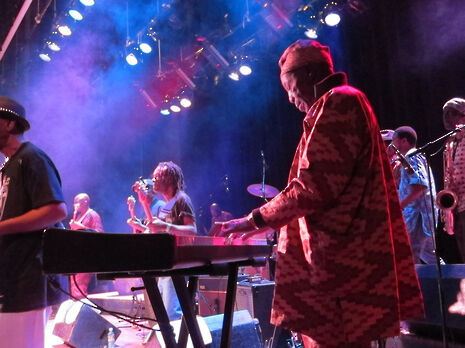Pop music and the Middle East
Political and cultural change don’t have to go hand in hand

A couple of days ago I was scrolling through the BBC news webpage when I came across a mini video series entitled ‘Middle East Beats’. The title had all the right words to make me click: it sounded edgy, I like music and, well, I like the Middle East. So I did, and I found it was a series devoted to exploring the music scene in different Arab countries. As an Arabic student, this may come as fairly unsurprising news, but there was another reason for my interest. Too often people in this region are reduced either to extremists or victims, but this series was choosing to explore a different side: a musical one. It sounded refreshing.
I started watching the videos. There was a rapper in Yemen, a band in Lebanon and a singer in Egypt, all of whom were fighting the system. The music was good, but I couldn’t help asking: what was wrong with the system? Had the war and terrorism that dominates our perception of the Middle East spread to the music world, too? The Lebanese band is called Mashrou’ Leila, and I recommend giving them a listen. They were one of the first bands with a Western sound to gain popularity in the Middle East. Other bands had attempted it before, but with little success. Yes, the songs are in Arabic and the musicians are Arab, but the style is clearly Western. There is an electric bass and a simpler, more distinct melody than you find in more traditional Arabic songs. Despite making a real effort, I still really struggle to understand the appeal of more traditional Arab music. I know several Jordanians who feel the same way; they are all in their twenties, many drink, and a lot of the women do not wear a veil. They dislike the more conservative side of Arab culture and its interpretation of Islam, preferring instead certain aspects of Western culture that seem more liberal. The music scene is one arena where this dynamic plays out: they prefer Western or Western-style music to the more traditional Arabic music.
Many of the friends I have made in Jordan fit into this category. I have been to their concerts, listened to their recordings and chatted about their favourite bands, Western and Middle Eastern. I like their music and I like to think we share a similar musical taste. But there are many who do not share this interest and here is where I feel ‘Middle East Beats’ goes wrong. The Mashrou’ Leila crowd are a minority, even among young people. When I asked a friend of mine, who prefers more traditional Arab music, what she thought of this music crowd, she said she found them puzzling. She did not understand why they disliked their own culture so much. I am not sure this music does represent a rejection of Arab culture, but it certainly strays from the norm.
As with many things, the reality is not so black and white. Within the Arab music world there is a large and complicated mix; there exist very traditional Arabic songs; songs retaining an Arab style but with Western lyrics; songs that are Arabic covers of Western songs; songs that mix Western and Arab melodies and switch between English and Arabic lyrics. I could go on but it is confusing already.
The point is not to debate which music style is truly ‘Arab’ or whether listening to Western music betrays Arab culture. I do not believe musical taste has to be so political. Instead, I wish to explain that the Middle East may be the only remaining area of the world not to have fallen in love with Western music. ‘Middle East Beats’ brings to Western eyes and ears a few bands possessing a Western streak and suggests they represent the modernising youth fighting the conservative music of the past. Why should modern music have to mean Western music? Let us get rid of the idea that ‘change’ only translates as ‘progress’ when it brings a society closer to emulating Western culture. Surely we can respect and understand the beliefs and struggles of an individual regardless of their music taste? Even if that taste is for Justin Bieber.
The aim of the series is honourable, and the musicians are talented individuals who face serious and unjust challenges in their own societies. Nevertheless, an ominous pattern emerges from the music selected for the programme; the Lebanese band play indie rock and the Yemeni girl raps. Most of those daring to stand up to political and societal injustices in the Middle East do not listen to Western or Western-style music.
The Arab Spring uprisings were not carried out to the tune of Taylor Swift’s ‘Shake It Off’. Please do not confuse the desire to change or remove a political system with the desire to abandon a culture and heritage.
 News / News in Brief: Postgrad accom, prestigious prizes, and public support for policies11 January 2026
News / News in Brief: Postgrad accom, prestigious prizes, and public support for policies11 January 2026 Comment / Will the town and gown divide ever truly be resolved?12 January 2026
Comment / Will the town and gown divide ever truly be resolved?12 January 2026 Comment / Plastic pubs: the problem with Cambridge alehouses 5 January 2026
Comment / Plastic pubs: the problem with Cambridge alehouses 5 January 2026 Lifestyle / The only party girl in the East Midlands12 January 2026
Lifestyle / The only party girl in the East Midlands12 January 2026 News / 20 vet organisations sign letter backing Cam vet course13 January 2026
News / 20 vet organisations sign letter backing Cam vet course13 January 2026








